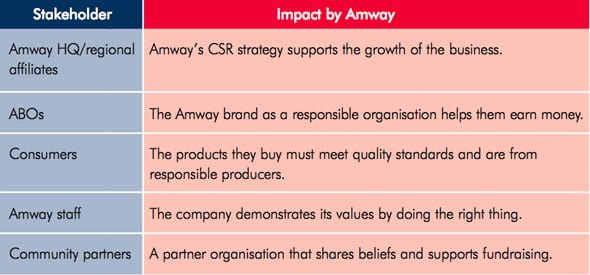
Amway is one of the world’s largest direct sales companies. It is a global enterprise and is privately owned by the families that started the company in 1959. Amway manufactures, markets and distributes more than 450 consumer products.
In the UK Amway distributes a variety of products, including:
- Personal Care – fragrances, body care and hair care products
- Skin Care and Colour Cosmetics
- Durables – cookware and water treatment systems
- Nutrition and Wellness – food supplements, food and drinks
- Catalogue Items – third party electrical goods
- Home Care – laundry, cleaning and car care products

Amway employs 14,000 people worldwide in its offices, manufacturing centres, warehouses, call centres and stores. It also works with around three million Amway Business Owners (ABOs) in more than 80 countries. These ABOs are the link between Amway and its products and the consumer. They also link Amway with communities across the globe. For more than 45 years, Amway Corporation has enabled people to have a business of their own.
Amway has built up a strong regional structure around regional affiliates, for example, Amway UK and the Republic of Ireland. Operating through the regional structure, affiliate companies are responsible for:
- forecasting (ensuring enough stocks are available to meet demand)
- managing customer service and contact with customers
- efficient distribution to ensure products reach ABOs on time and in top condition
- product promotion and ABO support, for example, supplying brochures to ABOs.
Amway is an example of a business that recognises its wider responsibilities. It recognises that to be a good corporate citizen, it needs to support causes that matter to the communities in which it operates.
As well as its business aims, the company has a range of social and ethical aims that are part of a ‘Global Cause Program’. Amway’s global vision is to help people live better lives.
At the heart of this commitment is the One by One Campaign for Children which helps disadvantaged children from around the world. This programme aims to support Amway”s employees, ABOs and customers in putting time and money into helping disadvantaged children get access to medicine and education.
Amway works with many different groups of people to carry out its business. This case study explores the relationship between Amway and its stakeholders.
Stakeholders

Stakeholders are groups or individuals who have an interest in the decisions of the company and its business. Stakeholders can be internal to the business, such as employees, or external, like suppliers, customers or the public.
A company may have shareholders who can be internal or external stakeholders. As a private company, the families who own Amway are its sole shareholders. It is important that Amway communicates regularly with its stakeholders. They can affect or be affected by the business.

Amway uses different ways to communicate with its various groups of stakeholders. The method chosen depends on the message and the person receiving the message:
- Websites, emails and voice mail updates promote products and services to ABOs and customers and keep them up-to-date
- Industry and trade memberships enable Amway to share and receive industry information
- Publications target key sales messages, for example, its monthly newsletter for ABOs, Amway Focus
- Events and exhibitions help Amway to communicate to ABOs, consumers and guests about running an Amway business and the products it can provide.
How stakeholders affect Amway
Amway is a direct selling company, selling products directly to consumers without going through traditional retail outlets or the ‘high street’.
The supply chain

A supply chain links the finished products to end consumers. Amway has its own distinct supply chain, placing a strong emphasis on its ABOs. They are able to focus on individual customers and their needs.
This supply chain is different from a more conventional supply chain that sells goods to final consumers through retail outlets. Amway’s way of working depends on building lasting connections with the end consumer. Feedback provided by consumers and ABOs helps to shape future changes in products and the service provided.
Suppliers must produce quality goods that Amway ABOs can sell with confidence. The goods should offer value for money and provide guarantees that they will meet Amway standards. Suppliers may contribute to the design and appearance of Amway products.
ABOs

ABOs operate independently as small businesses. They develop direct supply channels and sell products to friends and customers that they know or meet. They need to have a flexible approach to business. They require Amway to provide high quality, value for money products with a 100% satisfaction guarantee.
ABOs determine for themselves how they will conduct business. This is a ‘self regulatory’ environment. However, they sign a contract to work within Amway”s Rules of Conduct and Code of Ethics. If ABOs do not conduct business within these rules, their behaviour could reflect back on the company.
Consumers
Consumers affect how Amway develops and promotes products. They do this by indicating their preferences and requirements through feedback. Amway can then make more of particular products or change the format of others. Consumer demand also influences how much stock Amway needs to carry. Consumers can show where Amway needs to address issues or concerns to improve the business.
With many different types of stakeholders, it is possible that different groups will have different key objectives or priorities. For example, a business needs to make a profit but customers want low prices. The company might find it difficult to support price cuts, as this would reduce its profit. These two priorities might be in conflict.
How Amway affects its stakeholders
Amway’s vision is ‘helping people live better lives’.

Amway’s business plays a key role in the communities in which it operates. Amway has a global strategy for producing, distributing and marketing its products worldwide. It also has a strategy for promoting corporate social responsibility (CSR) in a global way. CSR refers to the role that a company plays in meeting its wider commitments as a citizen. Such commitments include supporting worthy causes and always acting in an ethical, honest way.
Amway operates in many different markets worldwide and has a range of affiliates and ABOs. It, therefore, has to devise and communicate its plans for corporate social responsibility activities carefully to take into account different priorities and interests. From the outset, Amway established some clear objectives. These were to:
- build loyalty and pride among ABOs and employees
- enhance Amway”s reputation as a caring organisation
- make a real difference in human lives.
- This helps to maintain Amway’s reputation with all its stakeholders.

Amway contributes time, effort and money to support its business communities:
- It creates appropriate Amway products for ABOs to sell.
- It develops campaigns that support the business and social aims of the company. Getting the image right is vital in a business that relies on building relationships with individuals and the wider community.
- Amway regularly seeks to develop new products in line with market research aimed at finding out what customers want.
- Its employees volunteer at different charity organisations.
- It has shared $294 million (around £150 million) with non-profit organisations since the company began.
Global Cause Program
Amway produced its Global Cause Program in 2002 as the result of extensive research. Amway defines a global cause as ‘a social issue affecting many people around the world engaged in a struggle or a plight that warrants a charitable response’.
The Global Cause Program:
- helps Amway to bring its vision to life
- declares what the organisation stands for
- builds trust and respect in Amway brands
- establishes corporate social responsibility as a high priority
In developing its global cause strategy, Amway also listened to what its ABOs cared about. Many favoured a cause to help children.
This led to Amway’s partnership with UNICEF”s Immunisation Plus programme. This aims to provide vaccination against the six most serious diseases affecting children in the developing world. Amway’s business image benefits from the relationship with UNICEF. UNICEF benefits from the fundraising Amway and its ABOs contribute.
Ethical business

Ethical enterprises do more than simply provide goods and services for customers. They also make a real contribution to the communities in which they operate by:
- creating employment and job security
- providing products that give consumers good value for money
- contributing to creating a more caring and cared-for community.
Competitive advantage
Businesses operate in a competitive environment. They may compete on a number of factors:
- price
- range of products
- quality
- speed of service
- customer service.
Amway is a global enterprise. It must comply with the laws of the many different countries in which it operates. Its business ethics provide a framework to guide the behaviour of the company and its stakeholders.
As part of its business values, it protects its consumers through the quality of the products and by offering guarantees of satisfaction. It promotes and supports ethical selling behaviour amongst the ABOs through its codes of conduct.
However, in a highly competitive market where businesses are similar, Amway needs to find a way of achieving a competitive advantage. Demonstrating a positive involvement in the community and attention to environmental issues can provide a business with a competitive advantage. It shows that the company behaves in an ethical way, shares its values and enhances its image as a responsible organisation.
Amway recognises that to respond to CSR issues, it must base its business on the principles of ‘relevance, simplicity and humanity’. For example, Amway set up the ‘One by One’ programme following discussions with various organisations involved in providing help to underprivileged communities worldwide.
Amway is also active in a number of programmes to reduce its impact on the environment, including:
- supporting organic farms to grow plants for their vitamin and mineral products
- training employees to protect the environment, for example, encouraging re-use and recycling to conserve resources
- changing product formulations to be more concentrated and biodegradable, which reduces packaging and waste
- using sources of renewable energy, for example, a wind farm at its World Headquarters will provide 10% of energy needs
- measuring its environmental impact by auditing its activities to internationally recognised standards
All these activities carry a cost, therefore Amway needs to balance the costs of its corporate social responsibility programmes against not only the benefits of doing so but also the cost of not doing so.
Business practices that do not take into account ethical behaviour might lead stakeholders to reconsider their relationship with the company. Suppliers might stop trading or customers might stop buying (which would result in a loss of revenues). At the company level, it might lead to infringement of the law or loss of reputation, which would influence the wider public.
Conclusion
Amway is a global direct selling organisation. It has to deal with many different stakeholders with different objectives. These stakeholders may be internal or external to the company and can affect or be affected by Amway in different ways.
Its organisational structure is based on a network of ABOs who work independently. Therefore, it is important that Amway sets the standards of ethical business behaviour for the people who work with, and for, the company. It demonstrates these standards by setting rules of conduct and codes of ethics.
In addition, it puts its ethics into practice through its various CSR programmes of activity, supporting the environment, its employees and disadvantaged children across the world.
 Partnerships with people (PDF)
Partnerships with people (PDF) 